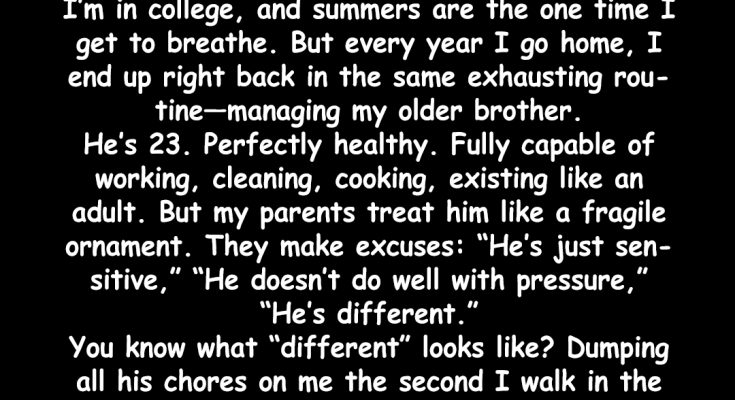He’s not disabled. He’s not a child. But every time I visit, they expect me to babysit a grown man.
I’m in college, and summers are the one time I get to breathe. But every year I go home, I end up right back in the same exhausting routine—managing my older brother.
He’s 23. Perfectly healthy. Fully capable of working, cleaning, cooking, existing like an adult. But my parents treat him like a fragile ornament. They make excuses: “He’s just sensitive,” “He doesn’t do well with pressure,” “He’s different.”
You know what “different” looks like? Dumping all his chores on me the second I walk in the door. Screaming if dinner’s not what he wants. Throwing tantrums when I try to leave the house without him.
The last time I went home, he locked himself in the bathroom for two hours because I told him I didn’t want to play video games. I’m not joking.
So this year, I told my parents I’m staying on campus. They called me selfish. Said I was “abandoning family.”
I told them I’m not a therapist, a babysitter, or a buffer. I’m their daughter.
That night, there was a knock at my door—
It was my dad.
He was standing there in his work uniform, baseball cap in hand like he’d stepped straight out of the past. I hadn’t seen him in months.
“Can I come in?” he asked softly.
I hesitated. Not because I didn’t love him, but because I knew he hadn’t come all this way just to visit. Something was wrong—or worse, they were trying to guilt me into something again.
I let him in. He sat on the edge of my futon like he was afraid to break it. “Your mom doesn’t know I’m here,” he began.
That got my attention.
“I read your text. And I get it,” he said. “I do. I know we’ve put too much on you. But I need to explain something.”
So I sat across from him on my desk chair, arms folded, trying to stay open.
“Your brother…” he began, then paused. “We’ve made mistakes with him. Big ones. But it started way back, when you were just a kid.”
He told me that when my brother was nine, something happened. Not something dramatic—no trauma, no diagnosis—but a shift. He started pulling away from other kids. Didn’t want to go outside. Cried during school. And they, not knowing what to do, just… let him.
“We thought we were being kind,” Dad said, eyes wet. “We told ourselves we were protecting him. But really, we were enabling him. We didn’t push him to grow up because we were scared he couldn’t handle it.”
He rubbed his hands together. “And then you came along, and you were so bright, so independent. We leaned on you too much.”
It was the closest I’d ever heard my dad come to an apology.
“I don’t want you to feel like you have to fix what we broke,” he said.
“So why are you here?” I asked.
He looked up at me, face tired. “Because your brother needs a wake-up call. And I think you leaving… it might be the only way he gets it.”
The next few weeks were quiet. My mom didn’t call as often. My brother didn’t text at all, which was no surprise—he never initiated anything unless he wanted something.
I felt guilty, then relieved, then guilty again. But mostly, I felt free.
I stayed on campus. Got a summer job at the campus bookstore, spent lazy evenings with friends, finally picked up piano again—something I’d dropped years ago because “the house was too loud” and my brother needed “quiet time.”
Then in late July, my mom called. Her voice was tight, clipped.
“He got a job,” she said.
I blinked. “Who did?”
“Your brother. At the grocery store. Two days a week to start.”
I almost dropped my phone.
Apparently, after I left, he spiraled. Screamed, sulked, threatened to stop eating. My mom tried to coddle him, but this time, my dad stood firm.
“No more excuses,” he’d told them both.
So, with great reluctance, my brother applied for a job. And got hired as a stock boy.
“He’s been coming home tired,” Mom said. “But… it’s good for him.”
I didn’t know how to feel. Part of me wanted to scream finally! The other part felt weirdly sad. It had taken me leaving for this to happen. Years of asking, begging, arguing—and all it took was silence.
But I guess sometimes silence says what words can’t.
By the time I came home for Thanksgiving, things were… different.
The house was quieter. Cleaner, too. My brother didn’t rush to the door. He barely looked up from the couch.
He muttered a hello. That was all.
Dinner was uneventful. No outbursts, no tantrums over mashed potatoes being “too lumpy.”
Afterward, Mom pulled me aside. “I’m proud of you,” she said. “For setting boundaries. I didn’t understand at first, but… I do now.”
It was the first time she’d said anything like that to me.
Later that night, I found my brother sitting on the back porch. Hoodie on, eyes staring into the yard like it held answers.
“I don’t hate you,” he said without looking at me.
I sat down beside him.
“You think I’m lazy. Spoiled. Maybe I was. But I didn’t know how to stop.”
I stayed quiet.
“When you left… I thought you didn’t love me anymore,” he admitted. “But I get it now. You needed to save yourself.”
I looked over at him, this boy who had once screamed because I changed the TV channel, now sitting beside me in the cold, admitting things I never thought he could.
“I didn’t leave because I hated you,” I said. “I left because I loved me.”
He nodded slowly.
We sat there in silence, not everything healed, but something mended.
The next summer, I did go home—for one week. My brother was still working at the grocery store. He had a little routine. Woke up, made his own breakfast, even started helping with dinner.
He still had his moods, but now he managed them. He even apologized once when he snapped at Mom.
It wasn’t perfect. But it was progress.
One night before I left, he knocked on my door.
“I signed up for community college,” he said.
My eyes widened.
“Just one class. But I want to try.”
I hugged him. He hugged back. Not a side-hug, not a stiff pat—but a real, full hug.
Looking back, I think the biggest lesson wasn’t about my brother.
It was about me.
I used to think loving someone meant sacrificing for them. Giving until you were empty. But that’s not love—that’s martyrdom.
Sometimes the kindest thing you can do is step away. Not to punish, not to abandon—but to let people face the consequences they’ve been shielded from for too long.
I’m proud of my brother. But I’m also proud of me—for walking away, and for knowing when to walk back.
And if you’re reading this, feeling trapped in a role you didn’t sign up for—this is your reminder: you’re allowed to protect your peace.
You’re allowed to say no.
You’re allowed to choose you.
If this resonated with you, hit like and share your own story in the comments. I’d love to hear it.

